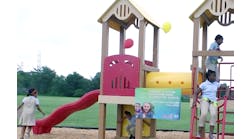Both recess and physical education should be provided daily to school children, the American Academy of Pediatrics says in a new policy statement. In addition, the group says, schools should not take recess away from students for academic or punitive reasons.
"Recess is a necessary break in the day for optimizing a child's social, emotional, physical, and cognitive development," the academy states. "In essence, recess should be considered a child's personal time."
The academy's policy statement on recess, "The Crucial Role of Recess in Schools," has been published in the January 2013 issue of Pediatrics.
In its support of school recess, the academy notes that some schools have reduced the time devoted to recess to provide more time for academic subjects. It also notes that time for recess decreases as a child ages and is less available to children of lower socioeconomic status and in the urban setting.
"Recess represents an essential, planned respite from rigorous cognitive tasks," the academy says. "It affords a time to rest, play, imagine, think, move, and socialize. After recess, for children or after a corresponding break time for adolescents, students are more attentive and better able to perform cognitively. In addition, recess helps young children to develop social skills that are otherwise not acquired in the more structured classroom environment."
The benefits of recess apply equally to adolescents and to younger students, the academy asserts.
The academy acknowledges that offering regular recess periods may pose security problems for schools, but argues that safety concerns should not be a reason for discontinuing recess.
"There are measures schools can take to address these concerns and protect children, while still preserving play during recess," the academy says.
For instance, school should provide adequate supervision of recess by qualified adults who can intervene if trouble arises; schools also should have a clear policy in place to prevent bullying or aggressive behavior, the academy recommends.
Some schools have begun to impose more structure to their recess periods, in which trained adults lead students in games and activities. The academy says schools that take this route should do be aware of possible pitfalls: "In designing a structured recess, (schools) will sacrifice the notion of recess as an unstructured but supervised break that belongs to the child; that is, a time for the child to make a personal choice between sedentary, physical, creative, or social options."
Another potential problem may arise if schools view structured recess as a replacement for physical education classes.
"The replacement of physical education by recess threatens students' instruction in and acquisition of new motor skills, exploration of sports and rules, and a concept of lifelong physical fitness," the academy says. "...The potential benefits of mandatory participation of all children in a purely structured recess must be weighed against the potential social and emotional trade-off of limiting acquisition of important developmental skills."

